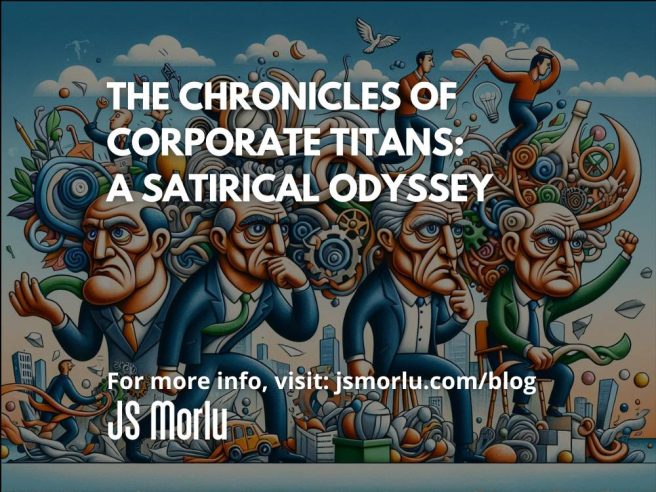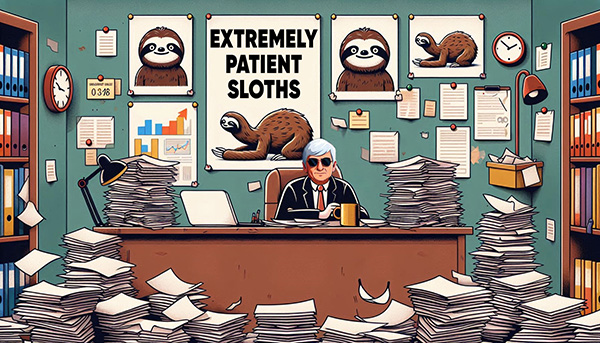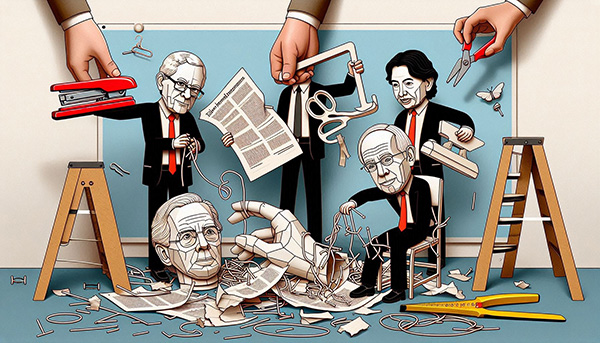By: John S. Morlu II, CPA
Introduction
In the vibrant kingdom of Entreprenopolis, where boardrooms gleam like royal courts and spreadsheets are revered as if they hold the secrets to untold treasures, the business landscape is both a thrilling arena and a labyrinthine challenge. Here, in this bustling metropolis of innovation and ambition, four titanic CEOs emerged as modern-day legends, each carving their unique paths to glory amidst the swirling dynamics of corporate life.
These leaders were not merely captains of industry; they were extraordinary figures who embodied the archetypal virtues of patience, strength, wisdom, and courage—qualities revered in both ancient and contemporary narratives. They reflected the patience of Job, who endured trials and tribulations with unwavering resolve; the strength of Samson, whose might could topple empires; the wisdom of Solomon, whose insights could untangle the most complex dilemmas; and the courage of David, who faced giants without hesitation. Yet, within the realm of Entreprenopolis, these time-honored traits manifested in ways that were as peculiar as they were illuminating, offering valuable lessons wrapped in humor and irony.
As we delve into the chronicles of these captivating figures, we will explore not only their remarkable journeys but also the idiosyncrasies that define their leadership styles. Each CEO faced the mercurial winds of change, adapting their approaches to navigate the intricacies of the modern marketplace. Along the way, they became emblematic of the broader challenges and opportunities that entrepreneurs and business leaders confront daily.
This narrative will illuminate the quirks and triumphs that arise when timeless virtues collide with the absurdities of corporate culture. From lavish board meetings that seemed more like theatrical productions to marketing strategies that defied conventional wisdom, the stories of these leaders serve as both cautionary tales and inspirational sagas. Readers will find themselves captivated by the lessons learned from their successes and failures, gaining insights into the multifaceted nature of leadership in a world that often defies logic.
Join us on this entertaining journey through Entreprenopolis, where the lessons of the past echo in the decisions of the present, and where every spreadsheet tells a story worth unraveling. Prepare to laugh, reflect, and perhaps rethink your own approach to leadership as we explore the remarkable—and sometimes ridiculous—realities of the corporate world through the lens of these extraordinary CEOs.
Chapter 1: Jobson, CEO of Procrasticorp
In the corner office of Procrasticorp, where motivational posters featuring sloths hung from the walls like sacred texts, sat Jobson—a man whose patience was so legendary, it had become synonymous with corporate inefficiency. Procrasticorp, renowned for its catchy slogan, “Why rush when you can wait?” was the undisputed global giant in the realms of delayed product launches, backlogged customer complaints, and timelines so stretched that they practically required a map to navigate.
Jobson had spent decades perfecting his unique brand of patience, which resembled that of a monk meditating in a traffic jam, waiting for enlightenment while the world whizzed by. He often compared himself to a seagull perched on the shore, casually observing yachts racing in the distance—certain that the seagull’s time would come. “We will release that product,” he’d declare with a nonchalant wave of his hand, “but first, let’s wait for the perfect market conditions, the right weather, and perhaps for Mercury to exit retrograde. You know, just to be safe.”
The zenith of Procrasticorp’s slow-motion ethos came when the company took a staggering 14 years to release a stapler with an ergonomic grip. It was hailed as a revolutionary breakthrough—until, of course, competitors launched flying staplers with Wi-Fi capabilities that could connect to your home network and remind you of your to-do list. Talk about a stapler with some serious multitasking skills! While the world marveled at the innovation, Jobson remained steadfast. “Patience is our virtue,” he insisted, even as investors slowly descended into madness, gnashing their teeth and questioning their life choices while Procrasticorp’s market share evaporated like a mirage in the desert.
Fun Fact: Jobson held an unbroken streak of 47 meetings that lasted over eight hours each, with absolutely no decisions made by the end. Yes, it was a Guinness World Record, but not the kind anyone was particularly proud of—though it did earn him a unique trophy shaped like a calendar that had never been opened. The trophy resided in the company lobby, right next to the coffee machine, which also had a perpetual “Out of Order” sign. Some employees swore it was Jobson’s secret plan to ensure people stayed in meetings longer—after all, what else was there to do without coffee?
Amidst the haze of corporate stagnation, Jobson had a well-meaning yet misguided belief that “deliberation” was the ultimate key to success. He once proposed a comprehensive three-year study on the effects of instant coffee on employee productivity, only to be met with incredulous stares from his executive team, who were already busy turning to decaf out of sheer despair. “Let’s not rush into things, folks,” he’d chuckle, blissfully unaware of the eye rolls swirling around the conference table.
In his downtime, Jobson could often be found crafting elaborate PowerPoint presentations on topics like “The Art of Waiting: An Exploration of the Benefits of Delayed Gratification in Business.” Attendees would leave more bewildered than inspired, wondering if they’d just experienced an engaging seminar or a collective corporate acid trip. One particularly memorable presentation, entitled “Strategic Procrastination: Why Today is Not the Day,” left an indelible mark on the company culture, inspiring many employees to embrace a more relaxed approach to deadlines—if there were any left at all.
As Procrasticorp continued to drift along, Jobson’s unique leadership style became a case study in the importance of timing—or perhaps the lack thereof. Employees often mused about how they’d spent more time waiting for decisions than actual implementation. “Maybe if we renamed our stapler ‘The Eternal Wait,’ it would sell better,” one employee quipped during a particularly drawn-out brainstorming session, sparking laughter that echoed through the hallowed halls of corporate inertia.
In the end, Jobson’s legacy was as much about his peculiar approach to business as it was about the countless lessons learned in the art of patience—whether it was how to survive endless meetings or how to perfect the art of doing absolutely nothing. While the world of entrepreneurship sprinted ahead, Jobson remained steadfast in his belief that slow and steady would one day win the race—just as soon as someone remembered where they parked the finish line.
Chapter 2: Samsonius, CEO of BrawnCo
In the heart of the fitness empire known as BrawnCo, the burly CEO Samsonius ruled with the kind of enthusiasm that could only be matched by a personal trainer on a double espresso. He was a larger-than-life figure, embodying the physical strength of the biblical Samson, but unfortunately, much of that strength was spent lifting corporate jargon and motivational quotes rather than actual dumbbells. BrawnCo, specializing in high-tech gym equipment and office chairs that doubled as squat racks, was the perfect playground for a CEO who believed that every challenge could be conquered by brute force.
“Why think when you can muscle your way through it?” was Samsonius’ personal motto, a phrase he had emblazoned in bold letters across the entrance to the office—right above the lifesize statue of himself, flexing triumphantly in a superhero pose. Employees often joked that the statue was the real CEO, given that it rarely caused any chaos or injury.
While other companies relied on innovation, Samsonius took pride in sheer physicality. He once declared war on a particularly slow quarterly report, deciding to lift the spirits of his shareholders by literally bench-pressing the document in a live-streamed event. The spectacle drew a huge audience, with social media buzzing. He managed to pump out a full set of ten reps, shouting motivational slogans like, “Feel the burn of success!” It worked—for about five minutes—until someone asked him why profits had plummeted by 40%. Flexing his biceps, Samsonius responded, “I don’t know, but look at these guns!” The shareholders, stunned into silence, had to admit: his biceps did look impressive, even if they didn’t quite solve their financial woes.
The company’s product line was equally misguided, demonstrating that Samsonius was living proof that muscles don’t always equate to brains. His signature creation, the “Herculean Desk,” was a steel-framed monstrosity so heavy it required three grown men to lift it—two to struggle with it and one to look on helplessly, shaking his head in disbelief. The desk featured a built-in weight rack, ensuring that employees could squeeze in a few sets of bench presses between conference calls. “Multi-tasking at its finest!” he’d declare, all while obliviously monitoring the number of workers who promptly refused to even approach the desk.
Then there was the “Titan Treadmill,” a machine so powerful it could allegedly run marathons on its own. Samsonius loved to challenge employees to a race against the treadmill, claiming that if you could outrun it for just one mile, you’d earn a month of free gym memberships. But like many things in the kingdom of BrawnCo, this promise fell flat when employees discovered the treadmill had a mind of its own and frequently entered “beast mode,” sending users flying off its back.
Samsonius’ crowning achievement—and by “crowning,” we mean a hefty weight attached to a briefcase—was the infamous “Barbell Briefcase.” This innovative blend of functionality and brute force combined the usability of a briefcase with the heft of a 50-pound weight. The idea was that employees could stay fit while toting their documents, but it turned out that most employees left after multiple hernia surgeries. The briefcase became more of a cautionary tale than a successful product, serving as a reminder of Samsonius’ misguided vision of corporate fitness.
Interesting Tidbit: At one point, Samsonius sponsored a corporate retreat where the team was forced to engage in a 72-hour deadlift marathon, claiming it would “build resilience and teamwork.” Most didn’t survive, while others reported lingering trauma and PTSD (Post-Traumatic Squatting Disorder). When the company received feedback that the retreat was a little intense, Samsonius shrugged and responded, “What doesn’t kill you makes you stronger! And if it does kill you, well, at least you went out lifting!”
In a bizarre twist of fate, BrawnCo also developed an exercise app named “Samson’s Strength,” which offered daily challenges for users to lift absurdly heavy objects around their homes—like their children, pets, and oddly shaped garden gnomes. The app became a viral sensation for all the wrong reasons, especially after a tutorial on how to deadlift a sofa went viral, complete with video compilations of users getting hilariously stuck.
Ultimately, the world of BrawnCo was a testament to the age-old wisdom that while strength and determination are commendable traits, they don’t always equate to success in the corporate arena. Samsonius’s escapades provided plenty of laughter—and more than a few visits to the emergency room—proving that in Entreprenopolis, the road to success is paved not just with muscle but with a good dose of common sense—and perhaps a lighter briefcase.
Chapter 3: Solomonstein, CEO of Wisecorp
In the illustrious halls of Wisecorp, a shining beacon of enlightened corporate decision-making, there reigned a ruler of unparalleled intellect—Solomonstein. This man was known for his wisdom that knew no bounds—except, perhaps, when it came to anything remotely practical. A master of philosophical debate and theoretical knowledge, Solomonstein spent his days immersed in a world where practicality took a backseat to the mind-bending complexities of corporate theory.
Board meetings under Solomonstein’s command resembled more of a philosophical symposium than a corporate strategy session. It was common for discussions to devolve into metaphysical musings about whether time is money or if revenue is merely an illusion created by consumerist society. “I’ve solved it,” Solomonstein once declared with a flourish, raising an eyebrow for dramatic effect. “The paradox of profitability! We need to both spend and save at the same time. Think Schrödinger’s cat, but with budgets!” The room erupted into a mix of confused stares and reluctant nods, as employees struggled to grasp how a feline could help balance the corporate coffers.
Under Solomonstein’s idiosyncratic leadership, Wisecorp produced a slew of products hailed as “intellectually brilliant but functionally confusing.” One such gem was the “Quantum Laptop,” which boasted the ability to operate in multiple dimensions simultaneously. Unfortunately, for most users, this meant it was hard to turn on, let alone utilize effectively. Customers often found themselves baffled by the device’s holographic keyboard that only appeared when the user was in a particularly deep state of existential contemplation. One user lamented, “I just wanted to check my email, not explore the mysteries of the universe!”
Another legendary product from Wisecorp was “The Infinite Calendar.” This cutting-edge invention came with no end date, symbolizing the endless nature of work-life balance. While it was marketed as a tool to help users feel liberated from the constraints of traditional scheduling, the reality was a bit more chaotic. Users reported missing appointments left and right, leading to a surge in no-show rates for everything from dentist visits to family dinners. One employee remarked, “I loved the idea of an infinite calendar until I realized I missed my mother’s birthday three years in a row!”
Investors at Wisecorp often found themselves engaged in mental gymnastics trying to decode Solomonstein’s unorthodox strategies. “Yes, our profits are low, but that’s because we’re taking a long-term view,” he would explain, stroking his chin thoughtfully. “Long-term as in, perhaps, 100 years from now. Wisdom isn’t rushed.” This left many investors scratching their heads and contemplating their own life choices. “Do I invest in a company or enroll in a philosophy class?” one investor pondered aloud, clutching his stock report as if it were a philosophical treatise.
Solomonstein’s quarterly updates were legendary for their length and complexity. One memorable session lasted two hours, during which he elaborated on why an accounting error was, in fact, a profound philosophical statement about the imperfection of human endeavor. “Isn’t every error a reflection of our flawed humanity?” he mused, leaving auditors speechless and contemplating their own existence as they drowned in a sea of spreadsheets.
Great Insight: Solomonstein’s intellectual prowess reached such heights that he was once nominated for a Nobel Prize in Economics for his magnum opus—a 1,000-page white paper titled “The Wisdom of Overcomplication.” Although he didn’t win, he claimed the nomination was victory enough. “For who truly wins in life?” he mused, gazing contemplatively out of his office window at the passing clouds, as if searching for the answers to life’s deepest questions.
Employees often found themselves yearning for a sense of practicality in their work, but under Solomonstein’s watchful eye, they learned that wisdom sometimes means accepting the absurd. There were whispers of a new initiative called “Rational Illogic,” which promised to help employees embrace the chaos while reaping the benefits of confusion. “Sometimes,” Solomonstein would say, “you just have to let the wind take you where it may—preferably in a company jet, of course.”
The culture at Wisecorp became a vibrant tapestry woven from the threads of intellectual discourse, misguided product launches, and an ever-present sense of philosophical absurdity. Employees often joked that working at Wisecorp was akin to taking a degree in existentialism, where every task came with a side of deep contemplation.
Yet, despite the whimsical chaos, there was an undeniable charm to Solomonstein’s approach. His ability to infuse humor into even the most mundane corporate policies kept morale high—who else could turn a discussion about expense reports into a spirited debate about the nature of money itself? And while profits may have been elusive, Wisecorp thrived on a unique brand of humor and philosophical inquiry that was perhaps the true currency of their corporate culture.
In the end, Solomonstein was a reminder that sometimes wisdom is found not just in profits, but in the laughter and the shared absurdities that come with navigating the unpredictable world of business—making Wisecorp a place where even the most tangled webs of confusion could spark a moment of enlightenment or, at the very least, a good chuckle.
Chapter 4: Davino, CEO of Slingshot Enterprises
In the ever-competitive landscape of the business world, Slingshot Enterprises stood as the scrappy underdog led by the bold and brave Davino. This man saw himself as the corporate David, ready to take on the Goliaths of industry with nothing but sheer determination and a handful of unconventional strategies. With the motto “Fast and fearless, with the aim of a slingshot,” Davino was ready to revolutionize the way business was done—except, often, his “slingshots” turned out to be metaphorical and, unfortunately, more of a miss than a hit.
Davino was notorious for his outlandish challenges to industry giants. One such moment came when he publicly declared a “corporate duel” against Amazon, proclaiming that Slingshot Enterprises could deliver packages faster if only the postal system would adopt trebuchets—those giant medieval siege weapons that you’d more likely see in a Renaissance fair than a logistics plan. “It’s not about size,” Davino would say, confidently stroking his imaginary beard, “it’s about accuracy. And giant medieval siege weapons!” To everyone’s surprise, this outlandish proclamation led to a brief uptick in his stock price, as Wall Street mistook his bravado for some kind of groundbreaking innovation. “Maybe we should all invest in trebuchets!” one confused analyst quipped.
Slingshot’s product lines were as audacious as their leader’s ambition. Their most famous product was the “Giant Killer App,” a calendar app that promised to revolutionize productivity. What did it do? It sent passive-aggressive reminders to users when they missed deadlines, with alerts like, “Another deadline you missed? Maybe try using your calendar, genius!” Davino proclaimed it would change the face of productivity forever, but all it really managed to change was the perception of Slingshot in the tech community. Competitors rolled their eyes and swiftly surpassed him, while Davino insisted that users simply needed to “embrace the discomfort of accountability.”
Despite his blunders, Davino held an unshakeable belief in his underdog story, much like a boxer who insists he’s one punch away from victory—even while on the mat. When Slingshot’s sales plummeted to near-zero, he thought a bold move was needed. So, he entered the company into a jousting competition against tech behemoths like Google, Apple, and Microsoft. Davino showed up in full medieval regalia, plastic lance in hand, ready to prove that sometimes, it’s not the size of your company that matters, but the size of your heart—or in his case, the absurdity of your ideas. He lost spectacularly, but not before his plastic lance broke in a dramatic fashion, sending him tumbling to the ground. “A valiant effort!” he declared, standing up with his head held high. “It’s not about winning; it’s about the chivalric spirit of competition!”
His antics were legendary, but none could rival the time Davino decided to spend $10 million on a marketing campaign for a product that didn’t even exist yet. His rationale? “It’s easier to build something when everyone’s already expecting it.” His team watched in horror as funds evaporated into thin air, all while Davino made grand speeches about creating “hype” for the non-existent product. “Just wait until we unveil it,” he promised. “It’ll be so innovative, it’ll blow everyone’s minds! Or at least that’s what I’ll tell them!”
In a strange twist of fate, his marketing blitz didn’t completely backfire. It sparked curiosity, leading people to start a rumor that Slingshot was working on the most revolutionary app ever. “Maybe we should just keep saying it exists!” one of his bewildered marketing team members suggested. “At this rate, we might just convince ourselves!”
While Davino’s ideas often fell flat, his relentless optimism and enthusiasm were infectious. Employees found themselves laughing through the chaos, rallying around the shared belief that one day, Davino would hit the target he aimed for. “Perhaps we’ll launch the trebuchet delivery service after all!” they joked, imagining a world where packages were catapulted to their doorsteps.
Through the ups and downs, Slingshot Enterprises became a case study in how the power of audacity, humor, and a little bit of madness could keep a company afloat. As Davino often reminded his team, “Even if we miss our target, at least we’re having fun trying! And who knows, maybe one day we’ll find a bullseye made of marshmallows!”
The journey with Davino as captain was always unpredictable, but in a world dominated by corporate Goliaths, he and Slingshot Enterprises stood firm, ready to take their next wild shot—because sometimes, the best stories are found not in the victories, but in the hilarious attempts to seize the day with a slingshot.
Chapter 5: Epilogue: A Cautionary Corporate Tale
In the grand theater of corporate life, the curtain finally fell on the four titans: Jobson, Samsonius, Solomonstein, and Davino. Each one, in their own colorful way, represented extremes of leadership that would make even the most seasoned business gurus raise an eyebrow. While their companies ultimately met their ends with the grace of a three-legged elephant on roller skates, the legends of their misadventures endured, leaving behind a legacy of bewilderment and chuckles.
Jobson, the embodiment of patience, turned his projects into epic sagas that could rival War and Peace—minus the interesting plot. His meetings would drag on longer than a Monday morning. “Patience is a virtue,” he’d remind everyone, staring at the clock like it was the last cookie in the jar, while employees silently pleaded for a coffee break. However, as his deadlines floated away like balloons at a child’s birthday party, it became evident that too much patience could, indeed, kill a project—along with the morale of the team.
Then there was Samsonius, the brawny CEO of BrawnCo, who believed that the world was best conquered through sheer muscle and motivational quotes. His mantra, “Why think when you can muscle your way through it?” was soon replaced by a new saying: “Why solve problems when you can lift them?” Flexing his muscles became his solution to every corporate hiccup, but alas, flexing didn’t resolve supply chain issues, nor did it help him understand basic accounting principles. Employees often found themselves caught between an inspirational quote and a weightlifting session, wondering if the next meeting would feature a “team-building” bench press.
Solomonstein, the philosophical genius, was known for his wisdom that bordered on the impractical. His meetings often devolved into metaphysical debates that would leave everyone pondering existential questions rather than addressing real business issues. “Is revenue merely an illusion?” he once asked, while the finance team wept silently in the corner. “If a budget is a tree in the forest, does it make a sound when it falls?” In the end, it became painfully clear that wisdom is valuable, but overthinking could, quite literally, drive your company into the ground—especially when it meant forgetting to file taxes.
And let’s not forget Davino, the scrappy underdog who thought that daring antics and medieval challenges could bring his company to glory. His audacious antics were often more entertaining than effective. Challenging Google to a duel? Genius!—if only in a fictional universe. While his heart was in the right place, his head seemed to be somewhere between a Renaissance fair and a sitcom plot. In the end, courage is essential, but there’s a fine line between bravery and sheer absurdity. Pro tip: don’t take on industry giants unless you’re armed with more than just a plastic lance and a dream.
So, dear reader, take heed of the cautionary tales woven through these extraordinary lives. If you ever find yourself in a boardroom, remember: patience is a virtue, but too much of it can lead to a project that would make a snail look speedy; strength is important, but flexing your muscles won’t exactly resolve supply chain dilemmas; wisdom is undoubtedly valuable, but if you find yourself overthinking every detail, you might just end up buried under your own analysis. And for the love of all that’s holy, don’t challenge Google to a duel—unless you want to witness your career go poof faster than a magician’s assistant.
Fun Fact: In a twist of fate, Procrasticorp eventually did release that ergonomic stapler… but only the day after the company was bought out by BrawnCo. Samsonius promptly rebranded it as a kettlebell, declaring it the future of fitness—who doesn’t want to get fit while stapling?
Thus, the chronicles of these corporate titans serve as both a source of inspiration and a cheeky reminder that balance is the key to success. Even the mightiest leaders must, at some point, step away from the weights, check their emails, and—dare we say it—make a decision without turning it into an existential crisis. So let’s raise a toast to moderation, clarity, and perhaps the realization that bench-pressing quarterly reports might not be the best way to impress the board! Here’s to a future where the real heavy lifting comes from strategy and teamwork, not just from the gym!
Author: John S. Morlu II, CPA is the CEO and Chief Strategist of JS Morlu, leads a globally recognized public accounting and management consultancy firm. Under his visionary leadership, JS Morlu has become a pioneer in developing cutting-edge technologies across B2B, B2C, P2P, and B2G verticals. The firm’s groundbreaking innovations include AI-powered reconciliation software (ReckSoft.com) and advanced cloud accounting solutions (FinovatePro.com), setting new industry standards for efficiency, accuracy, and technological excellence.
JS Morlu LLC is a top-tier accounting firm based in Woodbridge, Virginia, with a team of highly experienced and qualified CPAs and business advisors. We are dedicated to providing comprehensive accounting, tax, and business advisory services to clients throughout the Washington, D.C. Metro Area and the surrounding regions. With over a decade of experience, we have cultivated a deep understanding of our clients’ needs and aspirations. We recognize that our clients seek more than just value-added accounting services; they seek a trusted partner who can guide them towards achieving their business goals and personal financial well-being.
Talk to us || What our clients says about us






